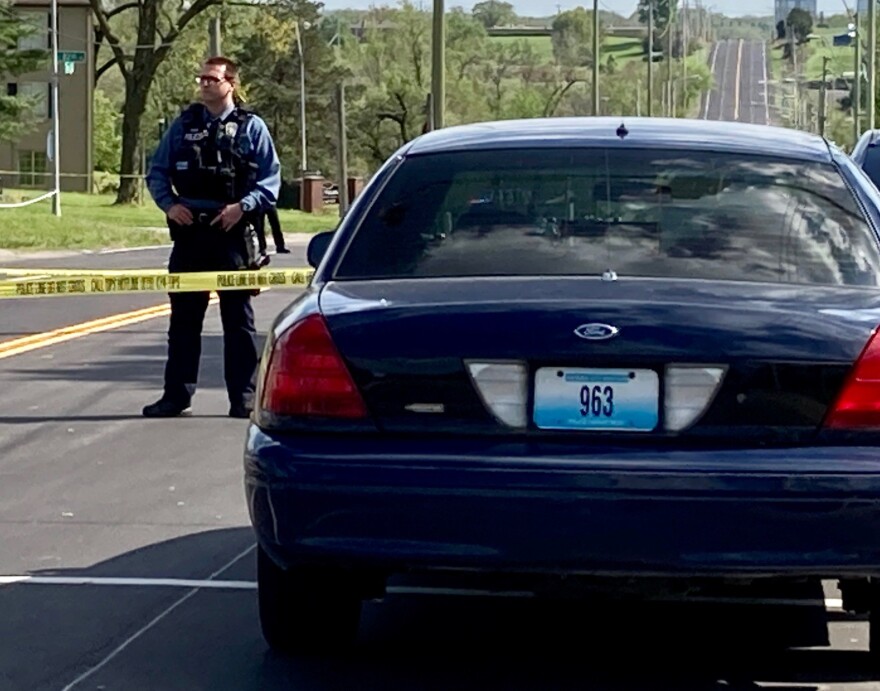An ordinance proposed by Kansas City Mayor Quinton Lucas to establish a $33 million community policing and prevention fund for the Kansas City Police Department drew opposition from residents and some council members at Wednesday’s Finance, Governance, and Public Safety Committee meeting.
The money would come from Kansas City’s general fund and would be used to hire more officers, increase salaries and hire staff dedicated to community outreach and crisis intervention. The breakdown of the funding is as follows:
- Hiring officers — $4,000,000.00
- Salary increases — $5,152,653
- Patrol and community outreach staff — $4,678,763
- Full-time Crisis Intervention (CIT) officers — $550,228
- 911 call takers and Communications Unit operations — $6,570,400
- Bullet-proof vests and other life-saving equipment — $175,000
- Inmate/Detainee food and beverage — $30,000.00
The remaining funds would go to KCPD’s violent crimes division, special operations and the police crime laboratory.
Lucas said the ordinance emerged from conversations with the Board of Police Commissioners and a letter from KCPD Police Chief Rick Smith, who listed those priorities for the department.
The mayor, by law, is one of the board’s five members; the others are appointed by the governor.
Under Missouri law, and because the KCPD is controlled by the state, Kansas City is required to allocate 20% of its general revenue to the department. Melesa Johnson, the mayor’s deputy chief of staff, said that amounts to nearly $236 million.
The proposed city budget calls for a total budget of $269 million for the KCPD, or about $33 million over the state-required threshold.
Lucas' ordinance directs the Board of Police Commissioners to explore community outreach models like Community Action Networks, in which residents and neighborhood leaders partner with police officers.
One local example is the Westside Community Action Network, in which a code enforcement officer focused on property maintenance, two police officers and a neighborhood specialist partner with local residents to improve the Westside neighborhood.
Lucas said he wants part of the $4.7 million for community outreach staff to include Community Action Networks.
The ordinance also directs the city auditor to conduct an audit of how the KCPD and the Board of Police Commissioners are using the Community Policing and Prevention Fund.
The $33 million is already included in the KCPD budget for the 2022-2023 fiscal year. Kansas City’s budget must be approved by the city council on March 24, meaning the ordinance must also be approved by that time to match the city’s budget timeline. If the ordinance is not passed then, the city council would need to remove the money from the KCPD’s budget.
Several council members pushed back on the ordinance.
Fifth District-at-Large Councilman Lee Barnes said he was concerned about providing the money upfront without having any controls in place.
“They will then have all of the dollars, but there will be no remuneration coming back to us as a city,” Barnes said. “There's no … enforcement of us having given them those dollars based upon what they said they would do. And that money's just gone for them to do whatever they wish to do with it.”
Fourth District-at-Large Councilwoman Katheryn Shields agreed, noting the council gave the KCPD funding in previous years to hold academy classes that did not take place. She said the ordinance did not provide enough direction for how the funds are allocated and used.
“I think we all should take the time to make sure that this understanding has in fact the direction in it and requirements, so that both the police understand that we mean business when we say we want them to train more police, we want to have more police out on the street,” Shields said.
Though the Community Prevention and Policing Fund supports hiring officers with crisis intervention training, Shields said she supports providing all officers with that kind of training.
About $12 million of the total fund is not specifically allocated. Third District Councilwoman Melissa Robinson said she worried about the wiggle room that gives to the police department.
“We have to make sure that our expectations are clear and they're explicit,” Robinson said. “So I don't like the fact that we don't have more specificity around the $12 million.”
The ordinance also met with opposition from residents who do not want to see the KCPD receive more city funds.
John Simpson of MORE2, a local social justice advocacy organization, asked the council to consider adopting an ordinance that would allocate 20% of the city’s general fund to the department — the minimum – and then create a separate fund to support mental health services, affordable housing and other programs to tackle root causes of crime.
“The past operations of the Kansas City Police Department have not reduced violent crime in our city. Putting more officers on the street doing the same old thing has not worked,” Simpson said.
Muwwakkil Talib, of the Kansas City chapter of National Black United Front, said the ordinance lacked transparency and accountability over the KCPD’s finances. Talib mentioned the council’s attempt last year to reallocate a portion of the KCPD’s budget to a similar fund for community policing and prevention.
“I'd ask that those same nine council members stand up again today to go against this ordinance,” he said. “If we give the Kansas City Police Department more money, we are continuously giving them the green light to continue to treat us the way that we have been treated.”






